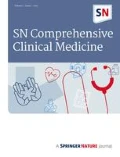Abstract
Objective: Examine factors contributing to the relationship between sleep-wake dysfunction and subacute post-concussion syndrome. Setting: Data collection online via Qualtrics survey. Participants: Forty seven adults reporting recent TBI recruited via Facebook and Reddit. Design: Moderation analysis via hierarchical multiple regression procedure. Main Measures: Neurobehavioral Symptom Inventory, Epworth Sleepiness Scale, Patient Health Questionnaire, General Anxiety Disorder Scale, and a General Health Questionnaire. Results: A relationship between sleep-wake dysfunction and symptoms of subacute post-concussion syndrome was observed. While premorbid mental health did not interact with this relationship, recent endorsement of depression and anxiety symptoms moderated the association. Exploratory analysis also suggested duration of posttraumatic amnesia inflated this relationship. Conclusion: These findings suggest that patients reporting post-concussive sleep dysfunction may benefit from mental health support. They also provide insight in to which early factors may be associated with the development of a sleep-related protracted recovery profile following a traumatic brain injury.


References
McMahon P, Hricik A, Yue J, et al. Symptomatology and functional outcome in mild traumatic brain injury: results from the prospective TRACK-TBI study. J Neurotrauma. 2014;31(1):26–33.
Carroll L, Cassidy JD, Peloso P, Borg J, Holst HV, Holm L, et al. Prognosis for mild traumatic brain injury: results of the who collaborating centre task force on mild traumatic brain injury. Journal of Rehabilitation Medicine. 2004Jan;36(0):84–105.
McCrea M, Guskiewicz K, Randolph C, Barr WB, Hammeke TA, Marshall SW, et al. Incidence, clinical course, and predictors of prolonged recovery time following sport-related concussion in high school and college athletes. J Int Neuropsychol Soc. 2012;19(1):22–33.
Sullivan K, Berndt S, Edmed S, Smith S, Allan A. Poor sleep predicts subacute postconcussion symptoms following mild traumatic brain injury. App Neuropsychol Adult. 2016;23(6):426–35.
Gottschlich M, Hyman S, Pisner D et al. 1169 Post-concussion Severity is Associated with Sleep Problems and Neuropsychological Status. Sleep. 2017;40(suppl_1):A436-A436.
Ponsford J, Sinclair K. Sleep and fatigue following traumatic brain injury. Psychiatr Clin North Am. 2014;37(1):77–89.
Diagnostic and statistical manual of mental disorders: DSM-5. Arlington, VA: American Psychiatric Association; 2017.
Macera CA, Aralis HJ, Rauh MJ, Macgregor AJ. Do sleep problems mediate the relationship between traumatic brain injury and development of mental health symptoms after deployment? Sleep. 2013;36(1):83–90.
Ponsford J, Willmott C, Rothwell A, et al. Factors influencing outcome following mild traumatic brain injury in adults. J Int Neuropsychol Soc. 2000;6(5):568–79.
Ghio L, Gotelli S, Cervetti A, Respino M, Natta W, Marcenaro M, et al. Duration of untreated depression influences clinical outcomes and disability. J Affect Disord. 2015;175:224–8.
Osborn A, Mathias J, Fairweather-Schmidt A, Anstey K. Anxiety and comorbid depression following traumatic brain injury in a community-based sample of young, middle-aged and older adults. J Affect Disord. 2017;213:214–21.
Jorge RE, Robinson RG, Moser D, Tateno A, Crespo-Facorro B, Arndt S. major Depression Following Traumatic Brain Injury. Archives of General Psychiatry. 2004Jan;61(1):42.
Johns MW. A new method for measuring daytime sleepiness: the Epworth sleepiness scale. Sleep. 1991;14(6):540–5.
Cicerone KD, Kalmar K. Persistent postconcussion syndrome. Journal of Head Trauma Rehabilitation. 1995;10(3):1–17.
Hayes AF. Introduction to mediation, moderation, and conditional Process analysis, second edition: a regression-based approach: Guilford Publications; 2017.
Jorge RE, Starkstein SE. Pathophysiologic aspects of major depression following traumatic brain injury. Journal of Head Trauma Rehabilitation. 2005;20(6):475–87.
Report to Congress on Traumatic Brain Injury In the United States: Epidemiology and Rehabilitation [Internet]. Centers for Disease Control and Prevention; 2015 [cited 2020]. Available from: https://www.cdc.gov/traumaticbraininjury/pdf/tbi_report_to_congress_epi_and_rehab-a.pdf
Author information
Authors and Affiliations
Corresponding author
Ethics declarations
All procedures performed involving human participants were in accordance with the ethical standards of the institutional and/or national research committee and with the 1964 Helsinki declaration and its later amendments or comparable ethical standards. Informed consent was obtained for all individual participants in the study and participants’ rights were protected. This study was conducted with grant funding through Southern Illinois University Edwardsville (SIUE). These data have not been published previously and are not under consideration for publication elsewhere. The authors assert no conflicts of interest. This study was approved and granted exempt status on Tuesday, February 12th 2019 by SIUE Social Behavioral Institutional Review Board. All authors listed were significantly involved in this study, and consent to having our names on the manuscript should it be accepted.
Additional information
Publisher’s Note
Springer Nature remains neutral with regard to jurisdictional claims in published maps and institutional affiliations.
This article is part of the Topical Collection on Medicine
Rights and permissions
About this article
Cite this article
Waller, C.S., Pawlow, L., Pettibone, J.C. et al. Amplifying Factors in the Proposed Relationship between Sleep-Wake Dysfunction and Post-Concussion Syndrome Pathogenesis. SN Compr. Clin. Med. 2, 526–530 (2020). https://doi.org/10.1007/s42399-020-00284-2
Accepted:
Published:
Issue Date:
DOI: https://doi.org/10.1007/s42399-020-00284-2

